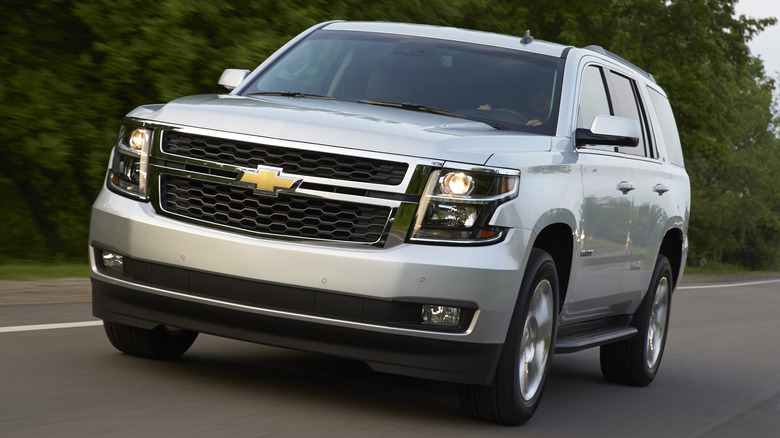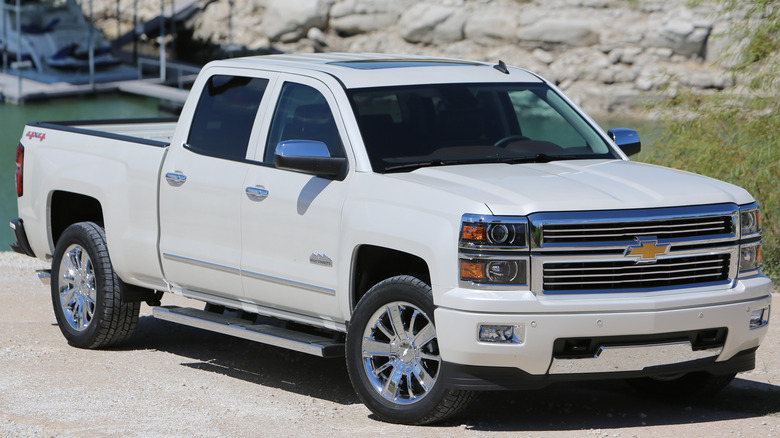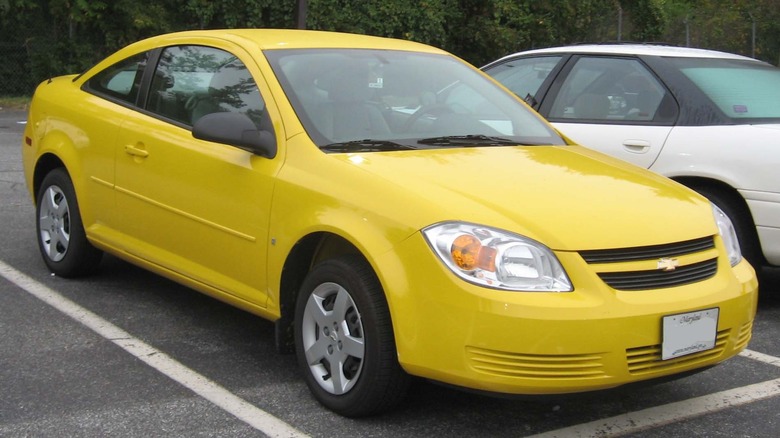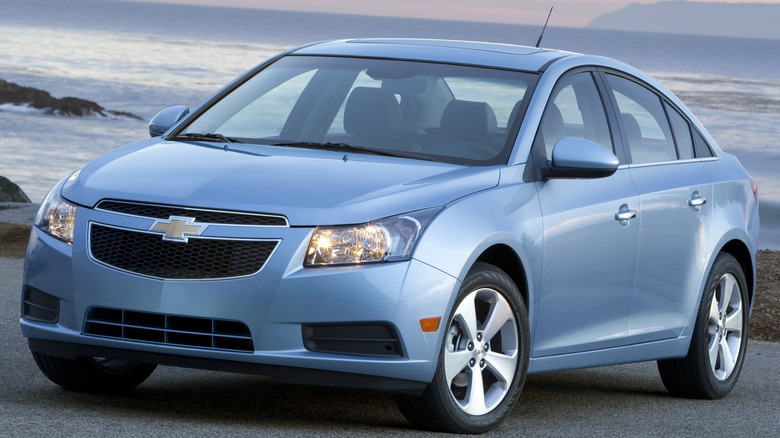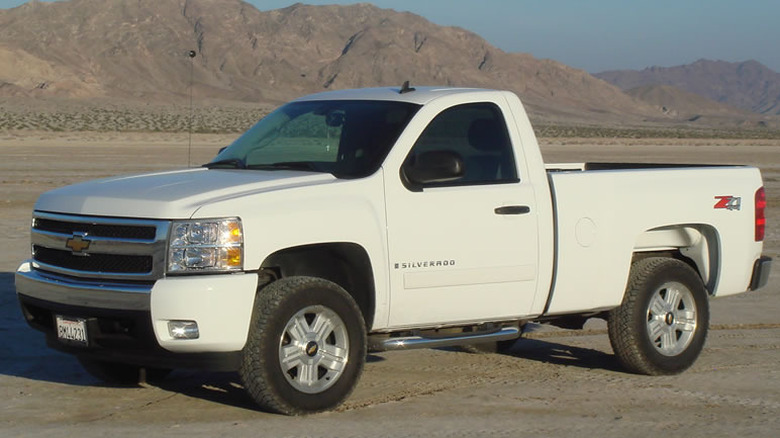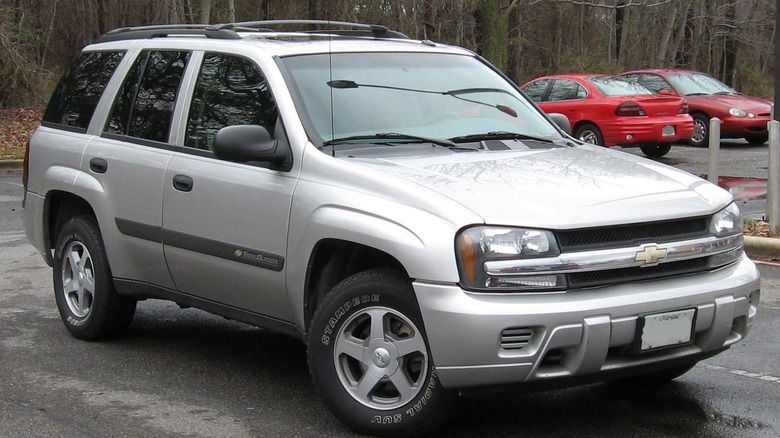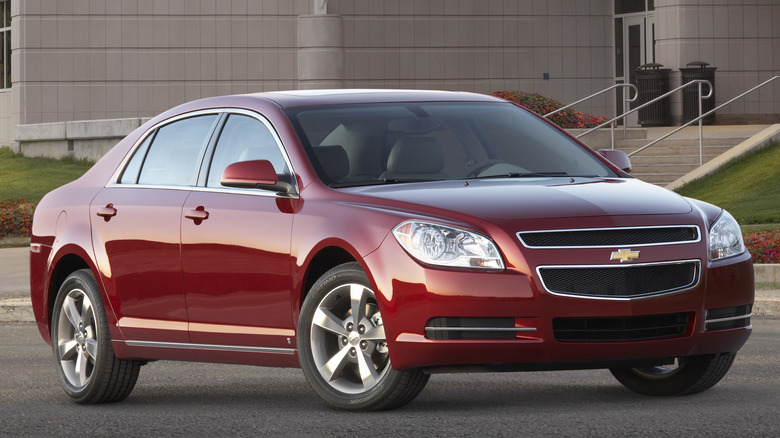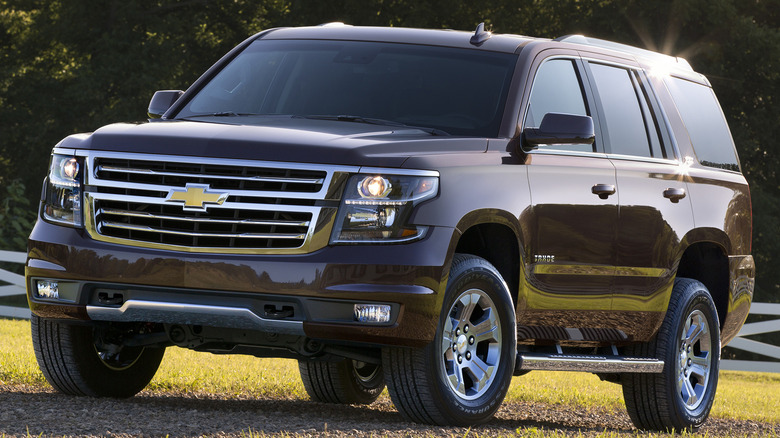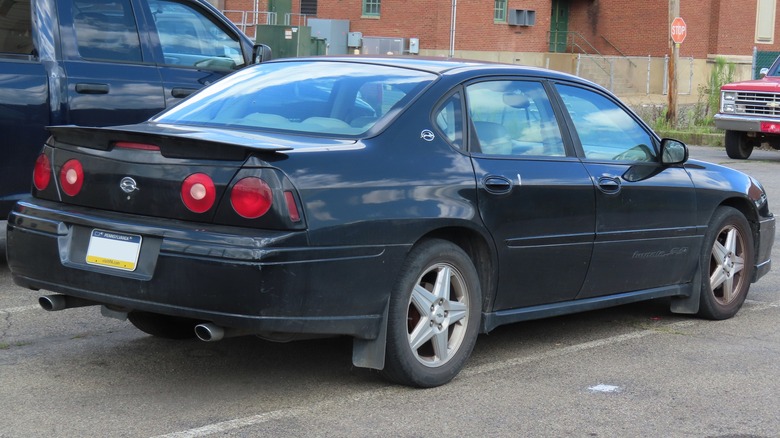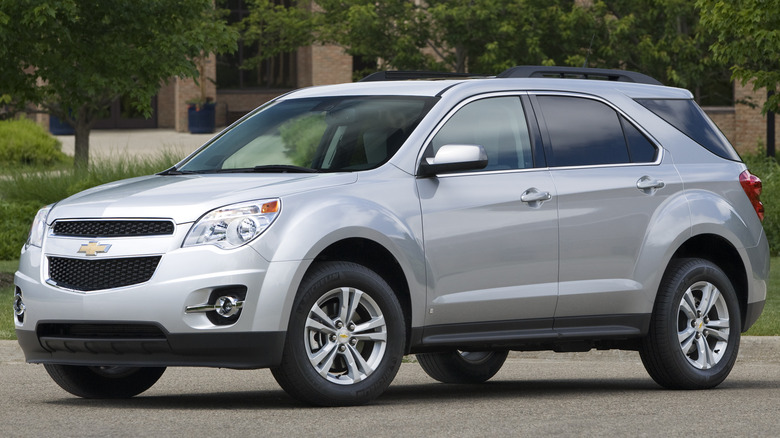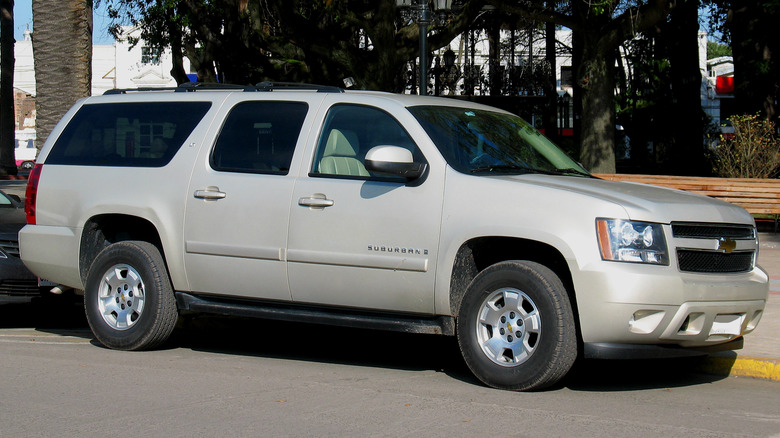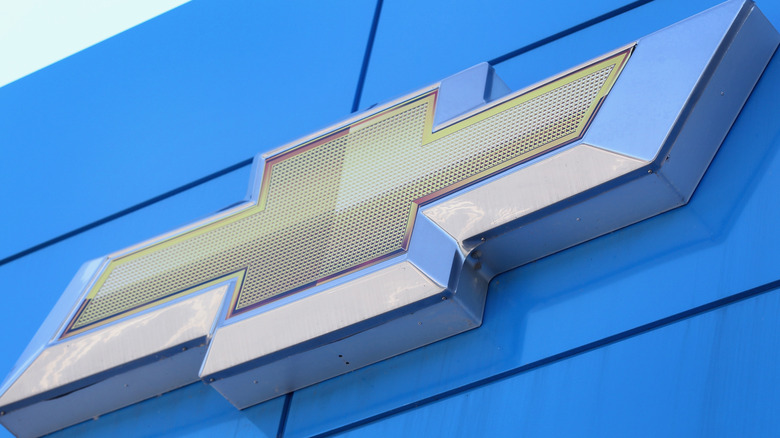10 Used Chevrolet Models You Should Steer Clear Of At All Costs
Chevrolet is likely best known, even by non-car enthusiasts, for iconic, high-performance muscle cars such as the Corvette, Impala, and Bel Air. However, the Detroit-based manufacturer has released and put its name to a wide range of vehicles as it moved with the times and responded to changing market and consumer demand. From huge pickup trucks to compact four-door sedans and even electric vehicles, if you're in the market for a used car, there's likely a Chevrolet out there that fits the bill.
The downside of having so many models to choose from, though, is that there will invariably be duds. Despite consistently posting better-than-average results in recent J.D. Power vehicle dependability surveys, more than a few Chevys from the past 20 years have proven to be unreliable cars that aren't worth buying on the used market.
We've gone through the U.S. NHTSA database and picked out 10 used Chevy models to avoid based on a combination of user complaints, recalls, and active NHTSA investigations. While this isn't an exhaustive list, it should give you a good idea of some models you should steer clear of.
2014 Chevrolet Silverado 1500
Chevrolet revealed the third-generation Silverado at the Detroit Auto Show in 2013, where Chevrolet showcased several significant upgrades over the previous model. These included more economical engines, new connectivity features via MyLink and IntelliLink, accident-avoidance technology, and damped tailgates. These improvements helped the 2014 Silverado 1500 win the North American Truck of the Year award at the same auto show in 2014.
However, the past decade has seen the 2014 Silverado 1500 go from a highly regarded truck to one that's racked up more than 1,400 complaints on the NHTSA website, along with 20 recalls and three NHTSA investigations. The 2014 Silverado 1500's recalls have involved dangerous issues such as unintended sudden braking, non-deploying airbags, sudden steering loss, and exhaust-related fires.
If the chance of having even a couple of these 20 recalls not being fixed wasn't enough reason to stay away, the 1,400-plus complaints should give any potential buyer cause for concern. Transmission and shifting issues are commonplace, with missing gears and rough shifting often culminating in wrecked transmissions (usually blamed on failed torque converters). The 2014 Silverado 1500 is also known for intermittent electrical failures. Having the cruise control and dash lights fail periodically is tedious enough, but having the electric power steering systems suddenly fail can be life-threatening if it happens at the wrong time.
2014 Silverado 1500s also have issues with active fuel management (AFM) lifters failing and causing misfires, which reduces engine power. While you can replace the lifters, many owners have had the issue recur after doing so.
2005 Chevrolet Cobalt
The 2005 Chevrolet Cobalt was the American car manufacturer's attempt to compete in the small car market against Japanese imports such as the Toyota Corolla and Honda Civic. It debuted at the Los Angeles Auto Show at the end of 2003, replacing the outgoing Chevrolet Cavalier, and was available in coupe and sedan models.
While contemporary reviews were broadly positive, the 2005 Cobalt's reputation suffered greatly due to an ignition barrel issue that meant the car could accidentally switch off even with the keys still in the ignition. This triggered a recall in 2014 after GM admitted that six people died in accidents caused by the fault, as reported by CBS News. The prospect of purchasing a car that an owner didn't send back to Chevrolet should be enough to put anyone off, but that's not the only problem with the Cobalt.
The NHTSA has logged 1,600 complaints about the Cobalt, the vast majority (1,100) centering around a faulty electric power steering system that fails suddenly and causes loss of control when driving. Electrical issues are also common, including the car randomly shutting off or taking multiple tries to start, alongside intermittent faults with warning lights and gear shifts attributed to a faulty transmission control module.
Unfortunately, the 2014 and 2010 recalls for the ignition and power steering faults don't seem to have resolved either issue entirely. Some vehicles that weren't part of the recalls have also developed problems, while some owners with recalled vehicles state that the parts eventually failed again.
2011 Chevrolet Cruze
Chevrolet's replacement for the problematic Cobalt debuted in 2008 at the Paris Auto Show, a full three years before it hit dealer forecourts in the U.S. Designed by GM Daewoo in Korea, the Chevrolet Cruze made a great first impression once reviewers got behind the wheel. Testers praised the comfortable ride and high-quality interior, and the Cruze seemed to have all the makings of a great, affordable daily-driver small car.
Sadly, like its predecessor, the 2011 Cruze's positive reviews were soon overwhelmed by various reliability issues in the decade since its launch. While it's not quite as bad as the Cobalt, the 700 complaints, six recalls, and two investigations listed on the NHTSA website are clear enough indicators that the 2011 Cruze is a car best avoided if you're shopping on the used market. Many 2011 Cruze owners have had issues with the engine, mainly with significant oil and coolant leaks.
Oil leaks are such a problem for the Cruze that Chevrolet issued a recall in 2012 due to the fire hazard posed by oil leaking from the engine. Unfortunately, several owners whose VINs weren't part of the recall also claim to have had chronic oil leak issues, which points to the fault being a model-wide problem. Even replacing the engine gaskets doesn't help, as the leaks will eventually return. Beyond the engine, the 2011 Cruze's transmission is also a sore point, with complaints often centering around it having trouble shifting and missing entire gears.
2007 Chevrolet Silverado 1500
The second-generation 2007 Chevrolet Silverado 1500 got off to a strong start by winning the North American Truck of the Year and Motor Trend Truck of the Year awards the year it launched. However, despite impressing the Motor Trend judging team and the Detroit Auto Show's 49-person judging panel, the years since then have not been kind to the 2007 Silverado. Over 1,000 NHTSA complaints, six recalls, and three investigations, plus a poor safety rating from the American Insurance Institute for Highway Safety (IIHS) make this another Silverado model to avoid.
The 2007 Silverado 1500 has been recalled once for a fire hazard stemming from the heated wiper washer system and twice for a potentially fatal exploding front airbag inflator — not problems you want to risk having on a used car. The NHTSA's investigations involved both issues, but the airbag inflator issue is still open as of 2024 — as it will be for most vehicles using Takata airbags from 2000 to 2017.
Owner complaints on the NHTSA website cover a range of issues, with rusted and ruptured brake lines one of the more regular issues owners have faced over the years. The electrical system also causes a range of problems for owners, from the inconvenient (difficulty starting) to the dangerous (intermittently failing traction control and total loss of power when driving). The Vortec V8 engines in the 2007 Silverado 1500 are also known for heavy oil consumption, which isn't just a hassle but can lead to engine damage if the previous owner(s) weren't vigilant about keeping the engine oil topped up.
[Featured image by Nakedicarus via Wikimedia Commons | Cropped and scaled | CC BY 3.0]
2002 Chevrolet Trailblazer
The Chevrolet Trailblazer started as a trim option for the Chevrolet S-10 Blazer SUV before Chevy decided to make it its own model with the 2002 Chevrolet Trailblazer. While more recent Trailblazers have a decent reputation as solid if perhaps unexceptional SUVs, the 2002 Trailblazer is more likely remembered as an unreliable vehicle not worth considering.
In the two decades since it launched, the 2002 Trailblazer has racked up nearly 1,300 NHTSA complaints and 14 recalls, with 11 NHTSA investigations to boot. Problems with the 2002 Trailblazer involve multiple aspects of the vehicle, from annoying — but cheap to fix — faults with the electrics to more serious issues with the powertrain. The 2002 Trailblazer's main electrical problem is the instrument cluster, which have a high failure rate. Some owners have the cluster go out entirely, while others end up with one that sporadically loses power.
However, it's the transmission problems that make the 2002 Trailblazer a clunker that's best avoided. Owner reports of transmission issues and failures litter the NHTSA website, covering everything from jerky shifting, missing gears, transmissions slipping out of gear, leaking transmission fluid, and wrecking themselves by randomly shifting down into low gear. Even in cases where the transmission remained intact, the only repair offered to owners was a whole new transmission.
The rest of the powertrain isn't too hot, either, and some owners have suffered from total (and repeated) engine failures with well below 100,000 miles on the odometer. The cooling fan clutch is also a bad component that consistently fails on most 2002 Trailblazers.
2010 Chevrolet Malibu
The seventh-generation Chevrolet Malibu launched in 2008 and was a hit with reviewers thanks to its significant improvements over the previous-generation Malibu, which Chevy produced from 2004 to 2008. Outlets such as Car and Driver praised its looks, comfort, and impressive performance for its class, even going so far as to claim that it competed with perennial four-door sedan favorites such as the Honda Accord and Toyota Camry.
While the car itself might be a good one, the issues that have cropped up in the nearly 15 years since it launched mean the 2010 Malibu likely isn't worth the hassle and potential headache for anyone seeking a used Chevrolet. There are several main culprits behind the 1,300-plus complaints on the NHTSA website, chief among them being the steering.
The electric power steering (EPS) system is a common cause of owner complaints, as it often fails randomly during driving, which in turn causes the steering to become heavy or even lock up entirely. The 2010 Malibu's EPS faults frequently occur in conjunction with electronic stability control (ESC) issues, which can be even more dangerous if they occur while the car is in motion. Transmission woes are also prevalent on the 2010 Malibu, and many owners ended up with immobile vehicles requiring a new transmission — sometimes with as low as 70,000 miles on the clock.
2015 Chevrolet Tahoe
Chevrolet unveiled the fourth-generation Tahoe at the Orange County Auto Show in 2013, promising improved fuel efficiency, better aerodynamics, and a better overall experience from the new full-size SUV. The Tahoe seems to have lived up to these promises, as evidenced by outlets such as Motor Trend praising its fuel economy and overall ownership experience.
While the 2015 Tahoe's 5.3-liter V8 seems to have been a good power plant with very few complaints, even nearly a decade later, the rest of the SUV hasn't fared all that well. The NHTSA website has 600 complaints, 16 recalls, and one investigation on record. The recalls have been for serious issues such as a tie rod separation risk, electric power steering failures, and a brake vacuum pump that would weaken and cause braking difficulties.
Despite the brake vacuum pump recall in 2019, owners continue to report problems with the brake feel changing suddenly, making the car difficult to stop. More than one owner claims that their brake issues have recurred after being sent in for a recall, which is disturbing. Minor electrical glitches also pop up regularly, with the Service Trailer Brake warning triggering at random — sometimes multiple times on a drive — being a constant source of owner frustration. The 2015 Tahoe's transmission also seems problematic, with a not-insignificant subset of owners dealing with jerky running and gearshift issues often attributed to the torque converter.
2004 Chevrolet Impala
The 2004 Chevrolet Impala was the penultimate model in the Impala's eighth generation. However, it was the first Impala generation to sport the front-engined, front-wheel-drive (FWD) layout the model retained until its discontinuation in 2020. Moving to FWD was a drastic — and possibly disappointing, depending on your allegiances — departure from the powerful rear-wheel-drive Impalas of old, but the eighth-generation Impala was well-liked for what it was: a reasonably fast and luxurious four-door sedan.
Unfortunately, the move to FWD wasn't entirely successful, at least in the reliability stakes: Based on NHTSA complaints and recalls, all eighth-gen (pre-2006) Impalas have proven problematic, with the 2004 model likely the worst of the bunch. Engine and electrical problems dominate, with an engine oil leak problem serious enough for Chevrolet to issue two separate recalls in 2015 due to the fire hazard inherent in having flammable engine oil leak onto the hot exhaust manifold.
The 2004 Impala's electrical issues are likely the biggest deal-breaker here, though. The PassLock security system is a good idea — it stops fuel from getting to the engine if you don't use the correct key. However, the 2004 Impala's PassLock system engages randomly and inconsistently, with owners locked out from starting their cars by an overzealous security system. More dangerously, some owners have even had PassLock engage while driving, shutting the engine down in the middle of traffic and putting them at risk of a severe accident.
[Featured image by MercurySable99 via Wikimedia Commons | Cropped and scaled | CC BY-SA 4.0]
2010 Chevrolet Equinox
The 2010 Chevrolet Equinox was Chevy's second take on the Equinox after first debuting the model at the 2003 Detroit Auto Show. Despite sharing the same platform as the previous-generation Equinox, the new model had a redesigned body and new direct injection engines that promised improved fuel economy. These improvements helped it make the finals of the North American Truck of the Year award in 2010, although it eventually lost out to the Ford Transit Connect.
Sadly, it's precisely these supposedly improved engines that make the 2010 Equinox such a poor buy on the used market. Despite none of the 2010 Equinox's engines having the problematic Active Fuel Management system that causes disproportionate oil consumption in other Chevy SUVs and trucks, owners have regularly complained to the NHTSA about their 2010 Equinox consuming unreasonable amounts of engine oil. One owner, for example, claims that their Equinox needs a quart of oil weekly to keep the engine going, while another reported having to go in for an oil change every 1,500 miles — both far too much, no matter how you look at it.
The consensus among owners (and their mechanics) is that the Equinox engines have defective piston rings that cause them to leak oil. Unfortunately, the check engine and oil warning lights seem to come on late (or not at all), so you can't rely on the car to tell you when the engine needs oil. It's very likely that many of the owners complaining of damaged engines simply ran their Equinox for too long with little to no oil in the engine, thus damaging it.
2007 Chevrolet Suburban
The Chevrolet Suburban has been around in some shape or form for nearly a century, with the first vehicle to carry the Suburban name hitting American roads in 1935. The 2007 Suburban is the tenth generation of Chevy's storied SUV range, debuted at the 2006 Los Angeles Auto Show with new, modernized (for the time) styling and improved safety features.
Owner grievances with the 2007 Suburban generally fall into engine-related woes and airbag problems. Chevy used Takata airbags in the 2007 Suburban, which means that this model year suffers from the Takata airbag issue that can cause the front passenger airbag to deploy randomly while driving. Chevrolet issued a recall for this fault in 2021 alongside several other models.
The 2007 Suburban's engine issues are twofold. Firstly, the engine is infamous for guzzling oil. The consensus is that engines with active fuel management (AFM) tech will eventually start needing a quart of oil every 500 to 1,000 miles or so — the cost of which can add up quickly depending on how regularly you drive. Owners often point their fingers at the AFM lifters here, as they tend to seize and cause issues such as misfires and the aforementioned excessive oil consumption.
Using too much oil isn't just a drain on the wallet, as it can also prove ruinous for the engine if it leads to running with little (or no) oil. Not having enough engine oil can cause premature wear and tear, potentially leading to some of the engine failures that also crop up regularly on the NHTSA website.
[Featured image by order_242 via Wikimedia Commons | Cropped and scaled | CC BY-SA 2.0]
Our selection methodology
We based our list of used Chevrolet models to avoid based on data from the NHTSA website, focusing on a combination of owner complaints, recalls, and, where relevant, NHTSA investigations. We focused on models with many owner complaints, as that's generally a great indicator of problematic models.
However, the nature and severity of the complaints also influenced our decisions. For example, we deem cars with a history of transmission problems more critical to avoid than those with comparatively minor complaints such as faulty lights or fuel gauges (for example).
While recalls ideally shouldn't be anything to worry about, there's always the risk that the particular used vehicle you're looking at hasn't gone in to fix the issues. The more recalls a model has, the larger the chance of unaddressed recall-related problems that the previous owner(s) overlooked or ignored. Given that some models on our list have faced recalls for potentially fatal issues, you'll want to err on the side of caution here.
